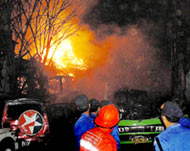Australia to tighten security measures
The Australian government is planning to give its security agencies more powers in a bid to clamp down on foreign “terror” suspects.

The government will seek the parliament’s nod to question non-English speaking suspects for longer and confiscate their passports.
The proposals were unveiled on Tuesday weeks after a Frenchman with suspected Al Qaida links was detained for breaching his tourist visa and deported to Paris for questioning.
Officials were unable to interrogate Willy Brigitte, 35, who was detained in Sydney last month.
Authorities said that Brigitte was involved in plotting an attack in Australia which has been named as a possible target after it sent troops to the US-led operations on Afghanistan and Iraq.
There has been no attack in Australia but 88 Australians were among the 202 people killed in the bombing of nightclubs in Bali, Indonesia, in October 2002.
Increased powers
Attorney General Philip Ruddock said the proposals would boost the powers of the spy agency, the Australia Secret Intelligence Organisation (ASIO), by giving officers the right to question non-English speakers who need an interpreter for 48 hours rather than 24 hours.
 |
|
The Bali blasts brought terrorism |
It would also make it an offence for a suspect to fail to surrender any passports, or to leave or attempt to leave the country after being notified of the issuing of a warrant.
“The amendments will ensure that ASIO has the ability to effectively collect information which is necessary to prevent a terrorist act,” Ruddock said in a statement.
Ruddock has been critical of amendments passed earlier this year to boost ASIO’s powers after the measures were watered down over months of wrangling to win political approval.
Under these amendments, ASIO has the power to hold anyone aged 16 and over for up to a week without charge if they are suspected of knowing of “terrorist” activities but they can only be questioned for 24 hours during that time.